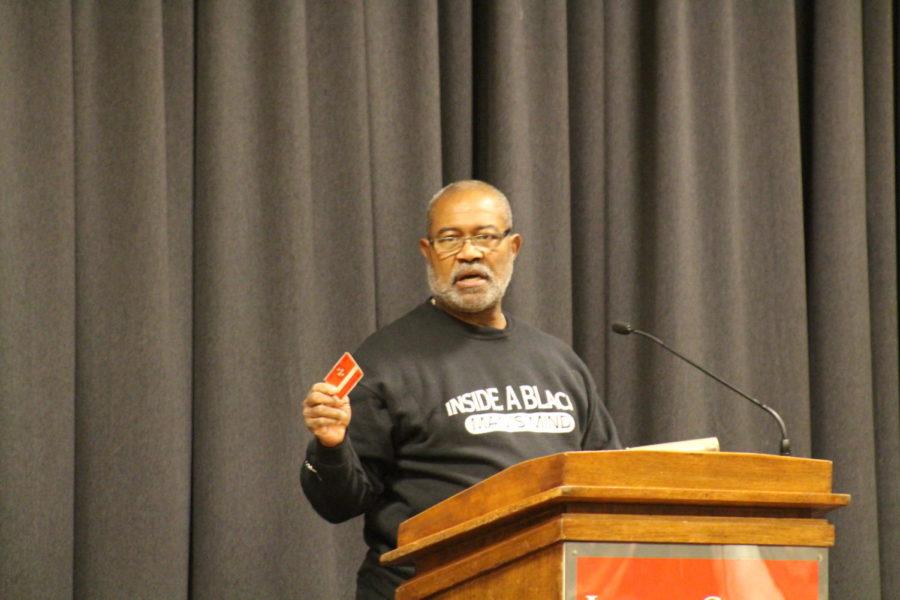Ron Stallworth, the inspiration for ‘BlacKkKlansman,’ chronicles experience within the KKK
Ron Stallworth speaks Jan. 24 at the Memorial Union about his story of being a black detective who infiltrated the Ku Klux Klan. “…And about 90 days later I got my membership card. Certifying me as a member of the knights of the Ku Klux Klan under David Duke’s operation for the year 1979.”
January 24, 2019
“You came to hear how a crazy black guy took on the KKK and made a fool of the grand wizard David Duke,” said Ron Stallworth, the black detective who infiltrated the Colorado Springs Ku Klux Klan in 1978.
On Thursday, to a packed crowd in the Sun Room of the Memorial Union, Stallworth told the story of his investigation that inspired his book “Black Klansman: A memoir” and the recent movie “BlacKkKlansman,” which is nominated for four Golden Globe Awards and six Oscars this year.
In October of 1978, Stallworth was sitting in his office as a detective in the intelligence division and was reading the newspaper to see what was happening and what could impact the city.
“On this particular day, I saw an ad in the classified section,” Stallworth said. “It said simply ‘Ku Klux Klan, for information’ and then there was a PO box.”
Stallworth decided to write a note stating he hated “n—–, spics, Chinks, Jews, Japs and anybody else who isn’t pure Aryan white like I am.”
Stallworth said he made a mistake when signing the letter. Instead of putting his undercover name, Stallworth signed his real name. A week later he received a phone call on the untraceable undercover line asking for him.
The voice on the other side of the line said they were Ken O’Dell, the organizer of the Colorado Springs KKK.
“He said ‘I got your note, you had some interesting things to say, why do you want to join,’” Stallworth said.
He continued the facade and O’Dell responded that Stallworth was just the kind of guy they were looking for and asked when they could meet.
“And that, ladies and gentlemen, was the beginning of my investigation,” Stallworth said.
The investigation, which involved using an undercover narcotics officer and an in-person stand-in, lasted for seven-and-a-half months.
During this time, Stallworth identified many KKK members who were military personal, two of whom were part of the North American Aerospace Defense Command (NORAD) and were in charge of monitoring the North American airspace.
Stallworth would use his intel to inform other cities and towns on when the Klan was planning on marching in their area and if they were going to participate in cross burnings. He also prevented a plan by the Klan to bomb two gay bars in Colorado Springs.
During the lecture, Stallworth recounted a variety of stories from his time within the KKK and the issues he sees in current day that parallel his experiences.
“I’ve been asked by a many of people ‘what was your plan going into this investigation?,” Stallworth said. “There was no plan, this happened off the cuff. I didn’t know what I was going to do.”
Throughout his time undercover, Stallworth built a relationship with the “grand wizard” and “national director” of the KKK, David Duke.
Stallworth said that Duke was the face of the KKK and was working to make the Klan more acceptable to the mainstream.
Stallworth said President Donald Trump followed David Dukes playbook to the White House. He also criticized the re-election of Congressman Steve King.
Stallworth’s investigation ended when O’Dell was leaving the army and the Klan needed a new leader.
“They had taken a vote and unanimously determined Ron Stallworth was a loyal and dedicated Klansman and they wanted him to become the leader,” Stallworth said.
The chief told him to end the investigation and destroy the files. Stallworth pretended to destroy the files and took home two notebooks about three inches thick accounting everything they had done.
“Those books remain with me today and they are the basis for how I wrote my book,” Stallworth said.
















